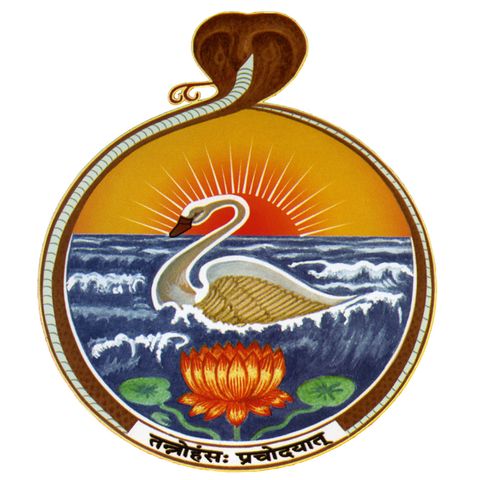85 - Attaining Royal Knowledge With Shraddha | Swami Tattwamayananda

Regístrate gratis
Escucha este episodio y muchos más. ¡Disfruta de los mejores podcasts en Spreaker!
Descarga y escucha en cualquier lugar
Descarga tus episodios favoritos y disfrútalos, ¡dondequiera que estés! Regístrate o inicia sesión ahora para acceder a la escucha sin conexión.
Descripción
-8th chapter: verse 28 9th chapter: verses 1, 2, 3 -The lecture was given by Swami Tattwamayananda on June 4, 2021. -8th chapter, 28th verse: “The Yogi who understands the...
mostra más-The lecture was given by Swami Tattwamayananda on June 4, 2021.
-8th chapter, 28th verse: “The Yogi who understands the full meaning of this supreme truth, he becomes a Jivan mukta. He gets liberated while living in this world, realizes the supreme truth, and gets results that transcend the collective meritorious results of all the ancient Vedic rituals.”
-Such a Jivan mukta realizes his true spiritual identity as the Atman. He looks upon life from a higher perspective and is not disturbed by the ups and downs of life, seeing them as part of the relative, momentary experience. He is always in a state of contentment.
-Lord Krishna describes contentment as one of the characteristics of a spiritual person. He is contented, practices yoga, has strong will, has restrained his senses and mind, and is devoted completely to the Lord. Contentment transcends happiness and unhappiness.
-Om Tat Sat. Thus ends the eight chapter of the Bhagavad Gita, which is a summary of all sublime teachings found in the Vedas, which deals with Brahma Vidya, and describes the three paths to attain it – Bhakti Yoga, Karma Yoga and Jnana Yoga – and which is in the form of a dialog between Arjuna and Lord Krishna.
-9th chapter, 1st verse: “Now I am going to teach you this most profound, highest spiritual truth, ways to realize it, and the art of making use of the realization in doing one’s duty. It is the royal secret.”
-Raja vidya refers to the royal spiritual truth that was practiced by enlightened kings. After learning from their teachers, these kings made use of that knowledge when ruling. King Chandragupta Maurya and his preceptor Chanakya are grand examples - the spiritual restraining power through Chanakya and the executive power through Chandragupta.
-Power should be given to one who does not want power. Wealth should be given to one who does not want wealth. Such people will make proper use of power and wealth.
-2nd verse: “Of all the branches of learning, this supreme truth is the highest (kingly), it is the supreme purifier because it does good to everyone, it pertains to dharma, it can be realized through direct perception, and it is easy to practice.”
-Spirituality is in reality, very simple. It tells us that spiritually, the entire existence is one. For a person who is spiritually fit, a simple statement such as Tat-tvam-asi is enough. Upon hearing this expression, immediately he will realize its true meaning and his identity with Brahman (Shabda-aparoksha-vada). Others will take more time for such realization and will have to pursue spiritual practices.
-3rd verse: “Those without shraddha, they won’t be able to think about the higher meaning of life. They do not attain Me, and they continue going the cycle of birth, life, death and rebirth.”
-Shraddha cannot be translated to a single word in English. It is best understood as what it is not – casual approach, dismissive nature, skepticism, doubt, restlessness – temperaments that make it difficult to focus. Shraddha can be described as a combination of integrity, sincerity, honesty, and desire for something sublime and higher with concentration and focus. To take interest in higher ideas, one needs shraddha.
-Hitopadesha says: “Food, sleep, fear, infatuation – these are common to both human beings and animals. What is unique about human beings is their ability to think about dharma and higher values.” The awareness of the need for these higher values gives us shraddha.
-It is not easy to be dis-satisfied with worldly life. When we start thinking “what is the meaning of life” – we board the bus of our spiritual journey, and we direct our efforts to come out of the wheel of samsara. When Buddha saw old age, disease and death, he developed shraddha and began his spiritual journey.
-When we do not look for higher values, then after death, we may take a descent in evolution. On the other hand, if we are interested in spiritual values, even if we do not succeed, we don’t lose anything – every good action will produce its results.
-We should not see a line of demarcation between spiritual and secular activities. Instead, we should spiritualize the secular.
Información
| Autor | Vedanta Society, San Francisco |
| Organización | Vedanta Society, San Francisco |
| Página web | - |
| Etiquetas |
Copyright 2024 - Spreaker Inc. an iHeartMedia Company
